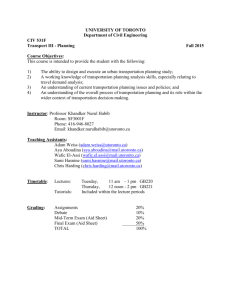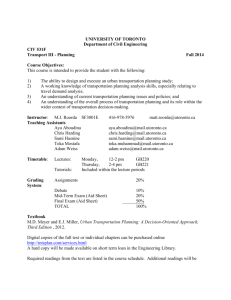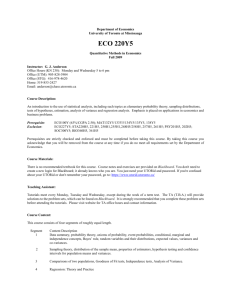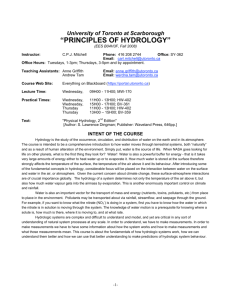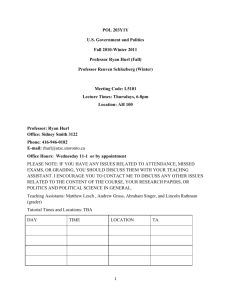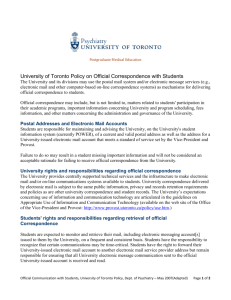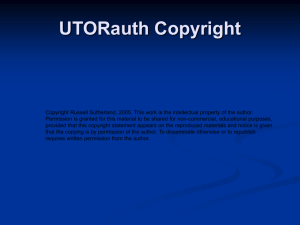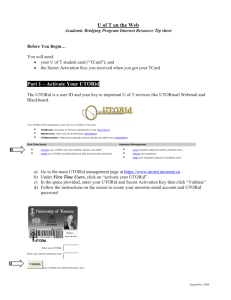UNI 220: Winter Term Course Outline
advertisement
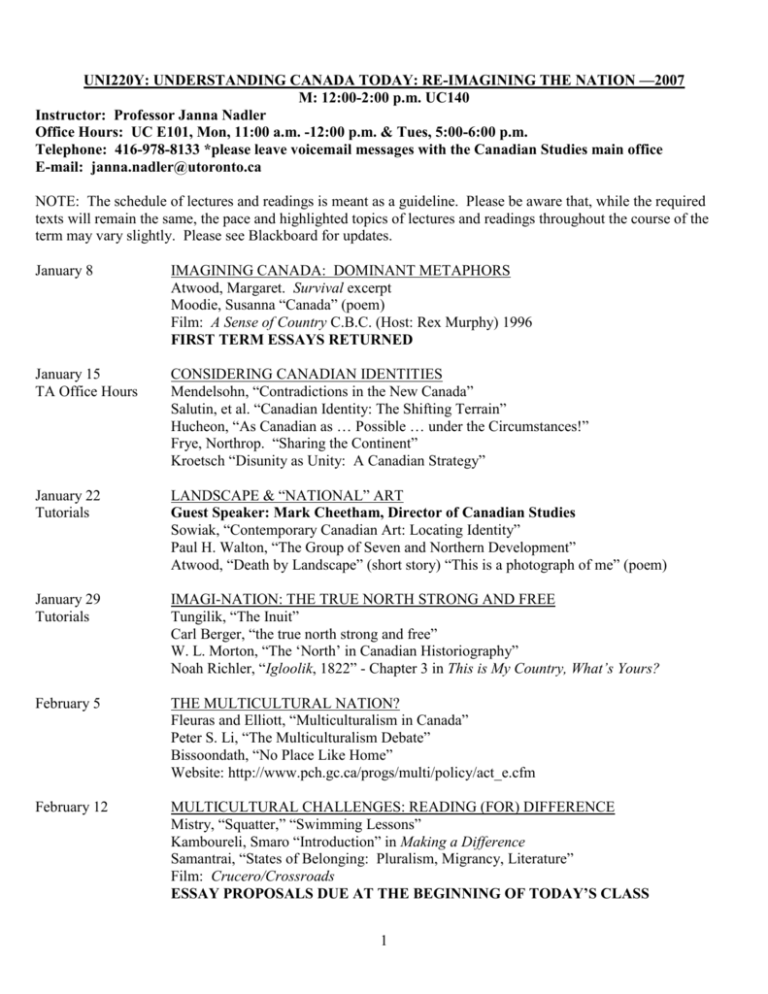
UNI220Y: UNDERSTANDING CANADA TODAY: RE-IMAGINING THE NATION —2007 M: 12:00-2:00 p.m. UC140 Instructor: Professor Janna Nadler Office Hours: UC E101, Mon, 11:00 a.m. -12:00 p.m. & Tues, 5:00-6:00 p.m. Telephone: 416-978-8133 *please leave voicemail messages with the Canadian Studies main office E-mail: janna.nadler@utoronto.ca NOTE: The schedule of lectures and readings is meant as a guideline. Please be aware that, while the required texts will remain the same, the pace and highlighted topics of lectures and readings throughout the course of the term may vary slightly. Please see Blackboard for updates. January 8 IMAGINING CANADA: DOMINANT METAPHORS Atwood, Margaret. Survival excerpt Moodie, Susanna “Canada” (poem) Film: A Sense of Country C.B.C. (Host: Rex Murphy) 1996 FIRST TERM ESSAYS RETURNED January 15 TA Office Hours CONSIDERING CANADIAN IDENTITIES Mendelsohn, “Contradictions in the New Canada” Salutin, et al. “Canadian Identity: The Shifting Terrain” Hucheon, “As Canadian as … Possible … under the Circumstances!” Frye, Northrop. “Sharing the Continent” Kroetsch “Disunity as Unity: A Canadian Strategy” January 22 Tutorials LANDSCAPE & “NATIONAL” ART Guest Speaker: Mark Cheetham, Director of Canadian Studies Sowiak, “Contemporary Canadian Art: Locating Identity” Paul H. Walton, “The Group of Seven and Northern Development” Atwood, “Death by Landscape” (short story) “This is a photograph of me” (poem) January 29 Tutorials IMAGI-NATION: THE TRUE NORTH STRONG AND FREE Tungilik, “The Inuit” Carl Berger, “the true north strong and free” W. L. Morton, “The ‘North’ in Canadian Historiography” Noah Richler, “Igloolik, 1822” - Chapter 3 in This is My Country, What’s Yours? February 5 THE MULTICULTURAL NATION? Fleuras and Elliott, “Multiculturalism in Canada” Peter S. Li, “The Multiculturalism Debate” Bissoondath, “No Place Like Home” Website: http://www.pch.gc.ca/progs/multi/policy/act_e.cfm February 12 MULTICULTURAL CHALLENGES: READING (FOR) DIFFERENCE Mistry, “Squatter,” “Swimming Lessons” Kamboureli, Smaro “Introduction” in Making a Difference Samantrai, “States of Belonging: Pluralism, Migrancy, Literature” Film: Crucero/Crossroads ESSAY PROPOSALS DUE AT THE BEGINNING OF TODAY’S CLASS 1 February 19 READING WEEK - NO LECTURE OR TUTORIALS February 26 Tutorials QUEBEC Hebert, “Quebec: The Core of First Time” Balthazar, “The Faces of Quebec Nationalism” Mavis Gallant, “In Youth Is Pleasure” Film: T.B.A. CBC News Article. “Debate: The motions on the Quebecois nation” http://www.cbc.ca/news/background/parliament39/motion-quebecnation.html CBC News Article. “Quebec nationalism, a long history” http://www.cbc.ca/news/background/parliament39/quebecnation-history.html ESSAY PROPOSALS RETURNED IN TUTORIALS March 5 Tutorials IMMIGRANT NATION I Kroetsch, “The Grammar of Silence” Janice Kulyk Keefer, “’The Sacredness of Bridges’: Writing Immigrant Experience” Harold Troper. “Immigrant City: The Making of Modern Toronto” Film: In the Shadow of Gold Mountain March 12 Tutorials IMMIGRANT NATION II Tamara Palmer Seiler, “Model of Virtue?” Jim Wong-Chu, “Equal Opportunity” Kogawa, Joy, Obasan excerpts Itwaru. The Invention of Canada “Introduction” and “Conclusion” March 19 Tutorials FIRST NATIONS Akiwenzie-Damm, “We Belong To This Land” Daniel Francis, “Marketing the Imaginary Indian” Pauline Johnson, “A Cry From An Indian Wife” Shirley Sterling, Excerpt, My Name is Seepeetza Website: RCAP – www.ainc-inac.gc.ca/ch/ March 26 GENDER & SEXUALITY Anne McGrath, “The Luckiest Women in the World?” Filax and Shogan, “Sexual Minorities in Canada” Dickinson, Peter, Excerpt. Here is Queer April 2 UNDERSTANDING CANADA TOMORROW Taras, “Surviving the Wave” Henighan, “Will Canadian Culture Survive in the 21st Century?” Noah Richler, “Epilogue” in This is My Country, What’s Yours? Pico Iyer. Excerpt from The Global Soul ESSAYS DUE AT THE BEGINNING OF TODAY’S LECTURE April 9 EXAM REVIEW SESSION: FIRST AND SECOND TERM MATERIALS FINAL EXAM TO BE HELD IN THE EXAMINATION PERIOD, APRIL 23 TO MAY 11, 2007. 2 Using Blackboard Logging in to your Blackboard Course Website Like many other courses, UNI220 uses Blackboard for its course website. To access the UNI220 website, or any other Blackboard-based course website, go to the UofT portal login page at http://portal.utoronto.ca and log in using your UTORid and password. Once you have logged in to the portal using your UTORid and password, look for the My Courses module, where you’ll find the link to the XXL101 course website along with the link to all your other Blackboard-based courses. Activating your UTORid and Password If you need information on how to activate your UTORid and set your password for the first time, please go to www.utorid.utoronto.ca. Under the “First Time Users” area, click on “activate your UTORid” (if you are new to the university) or “create your UTORid” (if you are a returning student), then follow the instructions. New students who use the link to “activate your UTORid” will find reference to a “Secret Activation Key”. This was originally issued to you when you picked up your Tcard at the library. If you have lost your Secret Activation Key you can call 416-978-HELP or visit the Help Desk at the Information Commons on the ground floor of Robarts Library to be issued a new one. The course instructor will not be able to help you with this. 416-978-HELP and the Help Desk at the Information Commons can also answer any other questions you may have about your UTORid and password. Email Communication with the Course Instructor At times, the course Instructor may decide to send out important course information by email. To that end, all UofT students are required to have a valid UofT email address. You are responsible for ensuring that your UofT email address is set up AND properly entered in the ROSI system. You can do that by using the following instructions: To submit the information to activate your UTORid and password (see above), you will need to click the “Validate” button. Follow the instructions on the subsequent screens to receive your utoronto.ca address. Once you have your UofT email address, go to the ROSI system (www.rosi.utoronto.ca), log in and update the system with your new UofT email address. You can check your UofT email account from 1. The UofT home page http://www.utoronto.ca: From the Quick Links menu on the top right, choose “my.utoronto.ca”. Enter your UTORid and password, and when the Welcome page opens, click “WEBMAIL”. 2. Email software installed on your computer, for example Microsoft Outlook or Mozilla Thunderbird. Visit the Help Desk at the Information Commons or call 416-978-HELP for help with the set up. Forwarding your utoronto.ca email to a Hotmail, Gmail, Yahoo or other type of email account is not advisable. In some cases, messages from utoronto.ca addresses sent to Hotmail, Gmail or Yahoo accounts are filtered as junk mail, which means that emails from your course instructor may end up in your spam or junk mail folder. You are responsible for: 1. Ensuring you have a valid UofT email address that is properly entered in the ROSI system 2. Checking your UofT email account on a regular basis. 3

